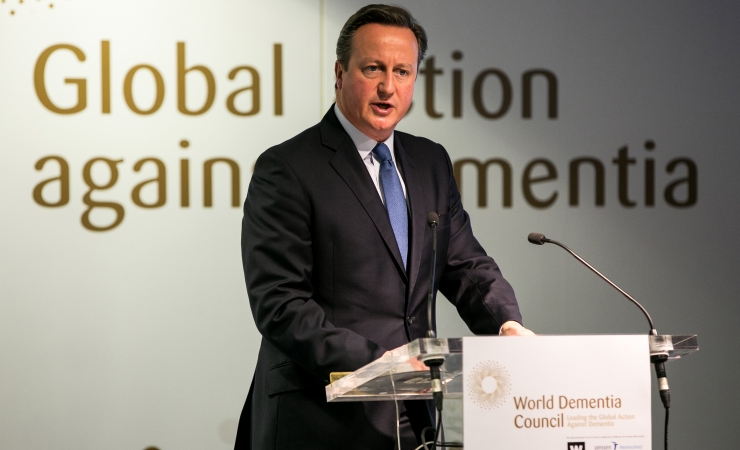
Key government leaders including former UK Prime Minister David Cameron, UK Secretary of State for Health and Social Care Matt Hancock MP, Dutch Deputy Prime Minister Hugo de Jonge, OECD Deputy Secretary General Ulrik Vestergaard Knudsen, and Japanese Assistant Minister for Health and Welfare Kenji Suwazono, came together in London on Wednesday 5 December at a World Dementia Council summit to find solutions to end the dementia crisis.
Today almost 50 million people around the world have diseases that cause dementia and that number is set to triple by 2050. Experts believe it is costing the global economy £1 trillion every year. Despite it being a major cause of death, we have no treatments which can prevent, slow down or cure the diseases.
The event, hosted by the World Dementia Council and supported by Wellcome and Janssen Pharmaceutical Companies of Johnson & Johnson, marks five years from the G8 summit in 2013. Hosted by Prime Minister Cameron, the 2013 summit bought the international dementia community together and set ambitious goals to develop a disease-modifying therapy, improve care and increase awareness by 2025.
The World Dementia Council has also launched a report challenging the international community to accelerate progress toward the 2025 goals.
Read the report
In an introduction to a report, David Cameron said he now saw a “light at the end of a very long tunnel” but outlined key areas which leaders need to now tackle to improve the lives of people affected by dementia. These included increased awareness and better-quality care, as well as more and better funded research into cure and prevention. He cited technology as having the “potential to change everything.”
Mr Cameron, who is now President of Alzheimer’s Research UK, added: “Why is it so important to bring world leaders together on this issue? Because this is a great global challenge of our time. No individual, organisation or country is going to be able to solve it alone. It doesn’t affect one country or some countries; it affects us all. It is too big and too complex to tackle without each other. And it will grow and grow if we don’t do more and do so now.
“Technology is key. It has the potential to transform everything, from how we manage risk, to how we deliver care. Big data can rapidly accelerate dementia research – not just biomedical research, but care research as well.
“Five years ago, I was daunted when I explained the scale of the challenge. But now, I feel a deep sense of confidence. Because there is light at the end of a very long tunnel. We are going in the right direction. And if we keep up the pressure, take all the steps we’ve said we would, there’s no reason the diseases that cause dementia cannot be defeated.”
Harry Johns, Chair of the World Dementia Council, and President and CEO of the Alzheimer's Association added: “Since the 2013 summit, there is much to be proud of – it helped propel international efforts and the world is a better place for people living with dementia than it was five years ago.
“But the job is not done. The job is far from done. Even with increased investments, dementia remains a globally underfunded area of medicine. We need to add funding to find a cure, create a global standard of high-quality care and ensure public health information around dementia risk and prevention is available to all. Now is the time to redouble our efforts, and for people like Marty and his family, ensure dementia remains at the top of the global health agenda.”
Also at the event in London today, announcements were made including:
- A review into worldwide dementia friendly initiatives to ensure they are meaningful and have real impact on the lives of people affected by dementia, led by Alzheimer’s Society, World Dementia Council, AARP and HGPI
- A white paper from The Global CEO Initiative on Alzheimer’s Disease, calling for immediate improvements to diagnosis and detection of Alzheimer’s Disease and related dementias worldwide
Marty Reiswig, from Colorado, United States, speaking at the event said: “My dad showed signs of Alzheimer’s at age fifty-two. My mom cared for him at home as long as she could, but now, at age sixty-six, my dad resides in a nursing home. He resides there, but he doesn’t live there. He spends his days in his bed or wheelchair, completely dependent on caregivers to feed him, bathe him, clothe him, and move him. He can’t speak. He can’t read. He can’t even watch television, because focusing on anything for more than a few seconds is impossible. This isn’t living. This isn’t life. My dad should be cheering at his grandkids’ soccer games. Looking forward to retirement. Traveling with his wife. This isn’t how things are supposed to be.
“Visiting my dad is a wrenching, emotionally draining experience. Alzheimer’s has stripped away virtually all of who he was. That’s hard enough on its own. But every time I look at him, I know there is a fifty-fifty chance I’m looking into my own future. And if it’s my future, then it could be my daughter’s future. It could be my son’s future. I don’t want my children to watch me deteriorate. I don’t want them to go through what I’m going through with my dad. I don’t want them to lie awake at night wondering if it will happen to them.
“That’s where you come in. Researchers. Drug developers. Elected officials. Leaders and influencers. We need you. We need you. Wield your influence with urgency. Slice through the red tape. Plow through every obstacle. Fight forward daily. Our time is running out. Together, we can save the world from Alzheimer’s.”